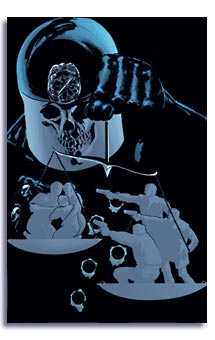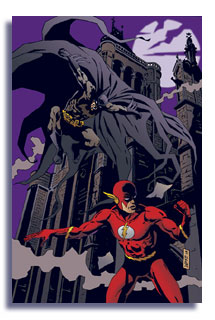|
Hey
Kids! Comics!
Astro City: Local Heroes #5
writer: Kurt Busiek
artist: Brent Anderson
"Sometimes
justice comes from the barrel of a gun." Well, of course in
Astro City you'd have to assume that vigilantes would have
that attitude. And in this intriguing end to Astro City's
return, Kurt Busiek makes a pretty strong legal case for it
(with some help from part-time comics writer and full-time
attorney Bob Ingersoll).
Other
writers may kick themselves for never having thought of this
before, or they may just smile and nod sagely. In telling
the story of the spectral Blue Knight, Busiek frames it with
the story of an innocent - if you will consider a lawyer innocent.
Defending
a "connected" murderer, defense attorney Vincent Oleck made
use of logic that would only work in the comic books. But
the surprise is that nobody else has tried to make it work
before. How, in a world running rampant with shape-shifters,
android duplicates, ghostly doppelgangers and the like, can
you be sure that you've seen who you've seen? Ever? When trying
to determine guilt beyond a reasonable doubt, it should be
impossible.
But of
course, there are those that know for certain. The Blue Knight,
at least, seems blissfully (and violently) free of doubt.
As Busiek has often done in the past, the information he gives
about this intriguing character is subjective, and by its
nature scant. Oleck narrates and drops hints about the vigilante's
larger career beyond the time their paths crossed, but like
the Silver Agent ("poor, doomed Silver Agent"), we may never
really know.
Busiek
is too busy building new corners to his world to keep going
back and filling in the details. Sure, he taunts us occasionally
that, no, really, in the next mini-series we'll get more.
But when Astro City is at its best, we're too busy
mulling over the fresh takes on old ideas to worry about what
we really don't know. Though this mini-series got off to a
bumpy start, the last three issues have been Astro City
at its best.
More
than a little of that comes from the steady work of Brent
Anderson. Working in tandem with Alex Ross, Anderson delivers
another arresting character design in The Blue Knight. It's
a shame that the previous line of action figures died barely
out of the gate; maybe DC Direct would consider reviving a
line based on Anderson and Ross' work. This avenging policeman
would look might sweet on a certain editor's desk…
At any
rate, the creators have done the best thing they could do
with this mini-series: left us wanting more.
Rating:

The
Flash #205
writer: Geoff Johns
artists: Alberto Dose and Howard Porter
For fans
of the DC Universe, this is a textbook example of how to do
a superhero comic. It starts right from the cover, one which
promises a confrontation that isn't quite as violently dramatic
within its pages, but it's bold.
In a
nice change of pace from recent editorial policy, Dose gets
to draw the cover, too. Though his style is a little more
down-to-earth and not quite as flashy (pardon the pun) as
Bolland or Kohlins were, it's still an attention-grabber.
Why belabor this point? Because the cover actually relates
directly to the interior rather than just being a pin-up,
something that Marvel seems to have lost sight of on a lot
of their books.
Catching
up with the plot, Wally West has just recently discovered
that he's The Flash. How did that happen? After the loss of
his unborn twins, Wally could not take the pain of his existence
as The Fastest Man Alive, and so his uncle's best friend Hal
Jordan (now The Spectre) wiped Wally's memory of it from the
entire world. Oh, people remembered there was a Flash, but
nobody remembered his secret identity which had been public
since Barry Allen died in Crisis On Infinite Earths.
Not that
you need to really know all that history, another reason why
this is such deceptively simple storytelling. Know that Wally
lost his memory, but a couple of issues ago, somebody jogged
it by giving him a Flash-ring, complete with compressed costume.
The answers
to mysteries raised in the last couple of issues appear, and
what makes them particularly fun is Johns' strong grasp of
all the characters involved. It's no secret that he loves
Captain Cold, and has made that one villain stand out above
all the others in the Rogues' Gallery. But Johns has been
building up for a touching moment with Cold that proves that
there is a kind of honor in the man. If the writer
ever gets to do the mini-series he wanted, I'm there.
This
is also one of the few Batman appearances (outside his own
books) where you can buy that this dark creature of the night
interacts with super-beings comfortably. Or at least as comfortable
as Batman can get. Again, the history isn't as important as
the attitude, and in conjunction with Dose's excellent face
work, you can almost hear the contempt in the Dark Knight's
voice as he realizes that Hal was involved. Even when the
guy has been forgiven by heaven, with almost unlimited power,
Batman will never trust him.
Though
Dose was a surprising choice for this book, he has proven
himself completely right for this arc. At its heart, this
story has little to do with superheroics; it's about grief
and putting the past behind you, something Wally has never
been very good at. For such a story, Dose does somber without
being depressing. (Two pages give us a quick look at his replacement,
Howard Porter, whose work at least seems more consistent than
it was on JLA -- I'm still not a huge fan.)
It's
textbook without being derivative. Though The Flash
hasn't had as high a profile as some other titles with creative
teams brought in for short bursts of sales, it deserves better.
It's solid, issue after issue.
Rating:

|







